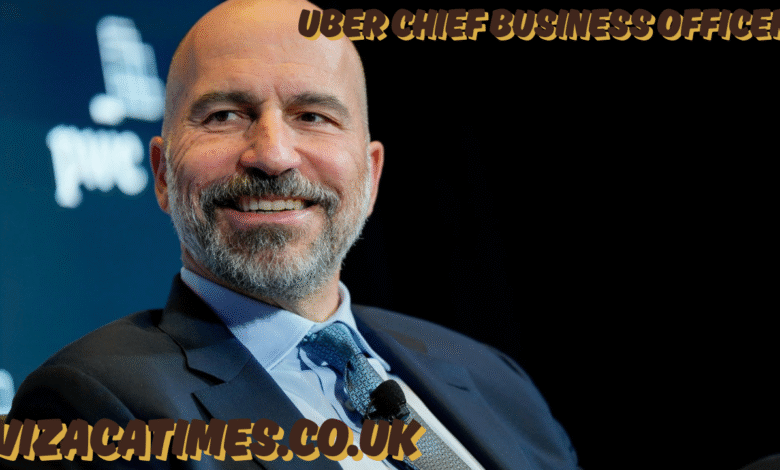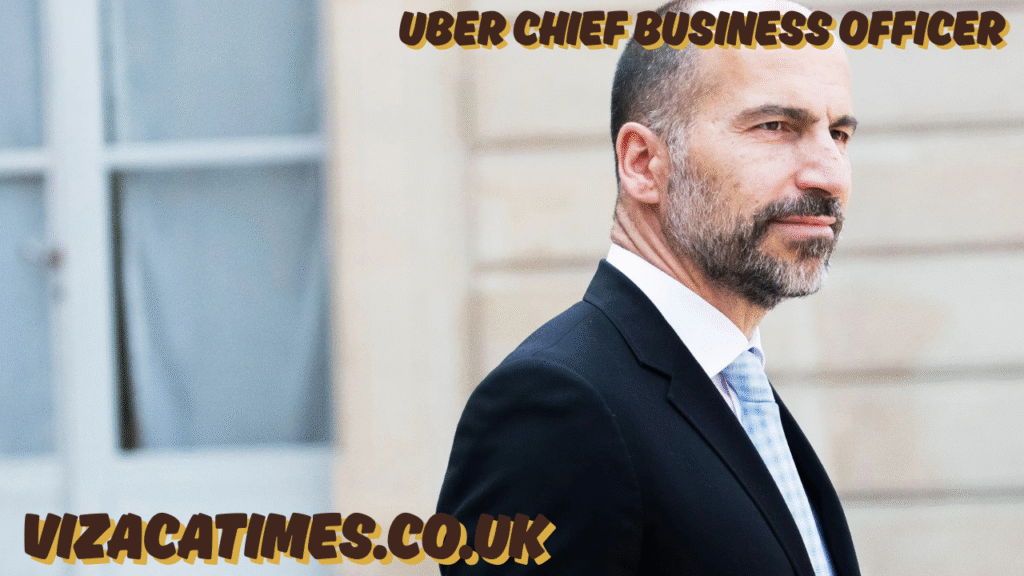Uber Chief Business Officer, ?? – Inside the Executive Role

Introduction: Who Is the Uber Chief Business Officer??
The role of the Uber Chief Business Officer (CBO) is a cornerstone in the company’s ambitious global operations, strategic partnerships, and long-term planning. As Uber has transformed from a simple ride-hailing startup into a multi-pronged global tech platform—offering everything from food delivery to freight logistics—the significance of its Chief Business Officer has grown accordingly.
This article explores the position of the Uber Chief Business Officer, ??, delving into the structure, strategic value, and influence the role holds in guiding Uber’s expansive vision. Whether filled by a prominent executive or in transition, this position remains central to Uber’s business development and global integration strategies.
The Role and Responsibilities of the Uber Chief Business Officer

The Uber Chief Business Officer is not just another executive title—it’s a leadership role that connects Uber’s vision with action. Typically reporting directly to the CEO, the CBO oversees a broad portfolio including:
- Corporate Development
- Strategic Partnerships
- Global Expansion
- Business Operations
- Regulatory Affairs
- M&A Activity
Uber operates in a highly competitive and regulation-sensitive market. As such, the CBO is instrumental in negotiating with governments, aligning with local markets, and spearheading strategic growth through mergers and partnerships.
Evolution of the Role at Uber: From Startup Hustle to Global Strategy
In the early stages, Uber’s operations were heavily focused on growth at all costs, often clashing with local authorities. The early “growth hacker” culture eventually matured, requiring a more professional and measured executive leadership team.
This transition paved the way for the CBO role to evolve. The Uber Chief Business Officer, ??, emerged as a key figure in shifting Uber’s narrative from being just a disruptive startup to a mature global enterprise. Over time, individuals in this role have had to:
- Balance aggressive growth with sustainable business models.
- Engage with regulators and communities to secure operating rights.
- Align internal teams with external opportunities in mobility, food delivery, and autonomous technology.
A Look at Notable Past Uber Chief Business Officers

Over the years, Uber has had a few influential figures hold the title or perform the duties associated with the Uber Chief Business Officer. Each brought unique strategies to the table.
Some individuals operated under similar executive titles but carried out equivalent functions. Their impact has ranged from securing billion-dollar investments to resolving complex international regulatory issues.
These leaders were responsible for navigating Uber through critical phases such as:
- Entering new markets like India, Southeast Asia, and Africa.
- Managing high-stakes acquisitions such as Postmates and Careem.
- Building strategic alliances with automakers, delivery services, and governments.
While the name or individual may change, the expectations from the Uber Chief Business Officer remain intense and multifaceted.
Strategic Impact: Uber Chief Business Officer in Mergers, Acquisitions, and Partnerships
One of the most essential tasks of the Uber Chief Business Officer, ??, is identifying growth opportunities through mergers and acquisitions (M&A). This includes:
- Acquiring regional competitors to gain market share quickly.
- Investing in technologies like autonomous vehicles and mapping systems.
- Partnering with external vendors and governments to facilitate services.
The Uber CBO helps drive decisions on whether to expand or consolidate. These decisions can make or break market performance, especially when Uber competes with well-entrenched local players.
For instance, Uber’s strategic exit from China in a merger deal with Didi Chuxing was a critical moment led in part by the corporate strategy team. These high-stakes negotiations often fall under the responsibility of the CBO.
Regulation and Advocacy: A Delicate Balancing Act
Given Uber’s constant friction with global regulators, the Uber Chief Business Officer plays a pivotal role in ensuring that the company stays operational while also influencing policy where possible.
The CBO’s duties in this domain include:
- Building relationships with municipal and national governments.
- Ensuring compliance with labor laws, especially around gig workers.
- Lobbying for favorable regulation around ride-sharing and delivery platforms.
This often involves working alongside legal and public policy teams. The CBO must be a skilled communicator, advocate, and diplomat—all at once.
Collaboration with Other Executives and Departments
The Uber Chief Business Officer, ??, does not operate in a silo. Their success depends on deep collaboration across departments including:
- Product and Engineering Teams – to ensure market needs are met.
- Finance and Investor Relations – to secure funding and report performance.
- Marketing and Communications – to shape Uber’s brand and narrative globally.
The CBO serves as a bridge between internal operations and external opportunities. This is especially critical in markets where Uber offers different products—rides, freight, or Uber Eats—depending on demand and regulation.
Challenges Faced by the Uber Chief Business Officer
Despite its resources and reach, Uber faces substantial challenges, many of which land on the desk of the CBO. These include:
- Sustainability – Balancing profitability with carbon neutrality goals.
- Competition – Competing with local players and global rivals like Lyft, Bolt, and DoorDash.
- Crisis Management – Navigating economic downturns, pandemics, or data privacy breaches.
- Employee and Driver Relations – Managing gig economy controversies and strike actions.
The Uber Chief Business Officer, ??, must respond to these challenges with both agility and long-term vision. Failure to do so can result in regulatory penalties, reputational damage, and declining market share.
What the Future Holds for the Uber Chief Business Officer
Looking ahead, the Uber Chief Business Officer role is set to become even more integral. As Uber explores futuristic initiatives like air taxis (Uber Elevate), autonomous delivery, and integration with public transportation systems, the CBO must:
- Champion innovation in uncharted industries.
- Build partnerships with tech firms and government bodies.
- Drive Uber’s expansion into verticals beyond transportation and food delivery.
Moreover, as Uber pledges to become a zero-emission platform by 2040, the CBO will play a pivotal role in aligning business goals with environmental and social impact.
FAQs on Uber Chief Business Officer, ??
Q: What is the main responsibility of the Uber Chief Business Officer?
A: The CBO is responsible for overseeing business development, strategic partnerships, global expansion, and regulatory affairs.
Q: Is the Uber Chief Business Officer the same as a COO?
A: Not necessarily. While both are senior roles, the CBO focuses more on external growth and partnerships, whereas the COO typically manages internal operations.
Q: How does the Uber Chief Business Officer influence Uber’s global growth?
A: By identifying expansion opportunities, securing partnerships, and managing market entry strategies.
Q: Does the Uber Chief Business Officer deal with government regulators?
A: Yes, this role is deeply involved in lobbying, advocacy, and compliance discussions with local and national governments.
Q: Who reports to the Uber Chief Business Officer?
A: Various teams including strategy, international operations, and corporate development may report to the CBO, depending on organizational structure.
Conclusion: Uber Chief Business Officer, ??, Driving Strategy in a Complex Ecosystem
The Uber Chief Business Officer, ??, represents more than just a corporate title—it is a vital node in Uber’s global engine. From steering regulatory negotiations to forming billion-dollar partnerships, the CBO ensures Uber remains agile, relevant, and competitive in a fast-changing world.
Also read : Corey McFarlane, ??, Leadership and Innovation Behind the Name – A Comprehensive Insight



